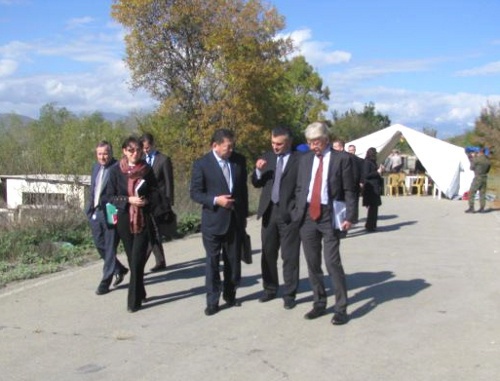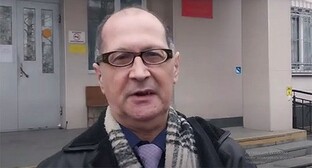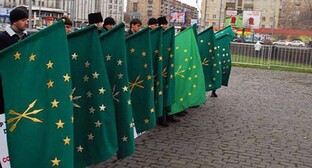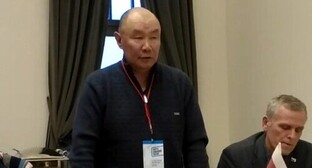
11 May 2011, 22:40
Utiashvili: despite complications, five-sided meetings allow Tbilisi to hold dialogue with Sukhumi and Tskhinvali
In the course of the five-sided meeting within the Mechanism for Prevention and Reaction to Incidents (MPRI) Abkhazia often does not agree even with those arrangements, "which can be achieved without any political consequences," while the problem with the Ossetian delegation is that "they more promise than fulfil," believes Shota Utiashvili, head of the Georgian delegation at these meetings.
Let us remind you that on June 7 the 16th round of Geneva talks on Security and Stability in Transcaucasia will take place and discuss security issues in the region. The five-sided format of the meetings on the MPRI was formed at the 4th round of the talks on February 17-18, 2009. The meetings are attended by observers from the EU, OSCE and delegations from Georgia, South Ossetia, Abkhazia and Russia.
"Abkhazian and South-Ossetian delegations stick to different negotiation manners"
"With the Abkhazians the problem is that they behave very toughly; and because they want to look tough, they reject even those agreements that can be achieved without crossing 'red lines' and without political ramifications. The problem with the South-Ossetian party is that they promise, but don't fulfil," Mr Utiashvili told the "Caucasian Knot" correspondent.
As an example he cited the fact that after the events of August 2008 the UN bus stopped travelling across the Inguri Bridge, which connects the Gali District of Abkhazia with the Zugdidi District of Georgia.
"Now there goes a cart with a donkey; and if a person moves from Abkhazia in Samegrelo or vice versa, he or she has either to walk for a kilometre or drive shaking in the cart. We offered Abkhazians to resume the bus traffic for those who cross the border but they refused. To be honest, I see no reason for refusal: what's the difference - since there's already a cart with a donkey, why not to use a bus?" asked Utiashvili.
Let us note here that earlier Ruslan Kishmariya, Plenipotentiary Envoy of the President of Abkhazia in the Gali District, said in his comment on Georgia's proposal to Abkhazia to open a bus route Tbilisi-Sukhumi that opening of direct transport route between Abkhazia and Georgia was completely excluded until Georgia recognized Abkhazia's independence.
As an example of the difficulties in negotiating with South Ossetia, Utiashvili reminded of the opening in Ergneti of the "NATO corner". "Nothing special, they just put a table at school table and put brochures on it. An activist of the NGO, which organized this show, said that it was now "NATO zone". Of course, it was an unofficial and meaningless phrase; however, after hearing it, the Tskhinvali delegates refused to meet in Ergneti and demanded to move the meeting to Dvani village; the travel there is half an hour longer than to Ergneti," said Utiashvili.
"Essential difference in relations of Georgia with Abkhazia and South Ossetia is in the issue of exchange of prisoners"
Exchange of prisoners is another significant difference in the relations of Georgia with Abkhazia and South Ossetia. According to Utiashvili, the prison of Abkhazia keeps only two persons, whom the Georgian authorities would like to release. However, they were convicted long ago, and the Abkhazian party has never raised the issue of any exchange.
"When Abkhazians detain someone for crossing the border, they either fine infringers or punish with administrative arrest and release in a few days," said Utiashvili.
In South Ossetia, the issue of border crossing is much more complicated. According to the South-Ossetian party, only in 2011 about 80 persons were detained for illegal border crossing.
"Basically, detentions are carried out by Russian border guards. They do it with pleasure, and then pass the detainees over to the KGB of South Ossetia. And the latter de facto holds those detainees for several months. The most severe example was Corporal Kobaladze, who was kept for more than 2 years without presenting any charges. He's already at large, but he still doesn't know why he had been kept in prison," said Utiashvili.
According to the head of the information-analytical service of the MIA, this great difference in the number of detainees is caused, among other things, by geographical peculiarities.
"The administrative border between the Samegrelo-Zemo Svaneti and Abkhazia runs mostly along the bed of the Inguri River. All residents know that one river bank in considered to be Abkhazian, while the opposite one is the Georgian. That is why, people cross it only if necessary," said Utiashvili.
He noted that South Ossetia has no border as such. "When Russian border guards routed the demarcation line, they often told people that their homes are in the territory of Georgia, but their fields or gardens are in the territory of South Ossetia. They warned that if people go to work in the garden, it will be a crossing of the international border entailing criminal prosecution. But how can a peasant live without his garden? Thus, those who are treated as infringers by Tskhinvali authorities are in fact local residents who work in their gardens or gather firewood in the forest," said Shota Utiashvili.
Currently, according to his story, South Ossetia keeps eight citizens of Georgia, demanded by the Georgian Party.
"Two of them remain in captivity after the exchange held on February 21, when 7 persons were released on each party. Another 9 persons were detained on February 8 in the village of Akhmadji on their way to the funeral. Some of them were released, others were arrested. It should be noted here that all whom they asked to release we released; and Tskhinvali no longer moves any demands on exchange. So, I just don't understand why they are arresting these people. They're just local residents," said Utiashvili.
Let us note here that during the regular meeting on May 5, at the border between South Ossetia and Georgia in the village of Dvani, the parties reached consensus on the issue of detainees. The "Caucasian Knot" correspondent was told earlier by Guram Sobaev, head of the working group of the MPRI from South Ossetia, the meeting decided to continue examining the issue of detainees and use the "hotline" to pass the lists of detainees for mutual transfer, without even waiting for the next meeting. Nevertheless, according to Sobaev, the Georgian Party refused to meet the relatives of the missing citizens of South Ossetia Khugaev, Khachirov and Pliev.
Utiashvili was not present at this meeting. According to his story, in order to return nine citizens of Georgia, the latter offers authorities of South Ossetia to release three convicts who are serving their sentences for committed offences.
"One of them is Maerbek Tedeev, who was serving his sentence in Tskhinvali for raping the wife of a Russian serviceman. During the August conflict, he escaped from the prison, attacked a post of Ossetian militiamen, took their firearms and passed to our side. We arrested him for bearing the firearms, which he had taken away from the militiamen, and sentenced to 3.5 years in prison. It is clear that such a man should stay in prison, same as the resident of the KBR (Kabardino-Balkarian Republic) Khoranov, who is serving his sentence in Georgia for possession of explosives. However, for the sake of liberation of innocent people, we were ready to pass these offenders to South Ossetia. However, the authorities of Tskhinvali rejected this proposal," said Utiashvili.
"Key issues at negotiations are crossing the border and terrorism"
As to the major problems at negotiations, Utiashvili said with the South-Ossetian party he will primarily raise issues of free border-crossing. "Ossetians should understand that they will not succeed in building a Berlin Wall here: people will keep going across this 'border' - both Georgians and Ossetians. Over time, the traffic across the border will only intensify," said Utiashvili.
He named terrorism and defence of the rights of the population of the Gali District to be the priority issues in relations with Abkhazia. "Since 2009, the territory of Abkhazia saw 30 terror acts, including explosions on the railway, in front of US Embassy and near the office of the Labour Party, and much more," said Utiashvili.
In his opinion, these explosions were organized by Russian special services.
"It should be noted that neither in Abkhazia nor in South Ossetia there are any armed units present in the conflict zone - only criminal gangs," said Utiashvili. He added that the villages of the Gali District are split among veterans of the 1992-1993 war, who collect 'taxes' from local residents in money or in kind, or force them to work in their fields and plantations.
The Abkhazian party, in its turn, accuses Georgia of organizing terror acts in the Gali District. In particular, according to the Abkhazian party, Malkhaz Kharchilava and Vazha Sichinava, shot dead on April 8, 2011, in the Gali District, were employees of the Department for Combating Terrorism of the Georgian Ministry of Internal Affairs.
However, according to Utiashvili, no evidences were presented that Sichinava and Kharchilava were employees of the Georgian MIA. "There can't be any evidences! Sichinava is a criminal who had committed a killing and kidnapping of a hostage in Georgia. He was sentenced in absentia to 19 years in prison. For about 10 years he had been hiding from the Georgian justice, including in the territory of Abkhazia. He just could not be a MIA employee," Utiashvili told the "Caucasian Knot" correspondent.
According to his story, the second casualty - Malkhaz Kharchilava - had already figured at the five-party meeting held in Chuburkhindji. "He really committed a killing in the territory of Abkhazia. The Abkhaz authorities attempted to detain him; and he was wounded. However, Kharchilava managed to cross the Inguri River. Because he was injured, he was sent to hospital. Later, during the Chuburkhindji meeting we received information about who he was and what he was wanted for. The Abkhazian party demanded to give him out. It was not possible: we do not issue anyone to illegitimate governments," said Utiashvili.
According to his story, the Georgian party understands that this person had committed a grave crime, and, therefore, offered the Abkhazian party to transfer Kharchilava's case to the Georgian party. "Since Georgia recognizes the Ochamchira District within its jurisdiction, Kharchilava would serve a much longer term in a Georgian prison than in an Abkhazian one. But we were not given the case, and after Kharchilava was discharged from hospital, we had no reason to detain him," said Utiashvili.
"Psychological atmosphere is usually human at talks"
When asked about the usual psychological atmosphere at negotiations, Utiashvili said that at meetings with Abkhazians and Ossetians, in spite of the complexity of the issues discussed, the atmosphere is "human".
"When negotiations just began, there were, of course, attempts of emotional pressure, particularly from the Abkhazians. But then it became clear to us that it was just their manner to negotiate. There is the European style, there is the American or Russian way; and the Abkhazia manner: they start with expressing their tough and categorical position, so that to impress the opposing party that no compromise is ever possible. But over time we gained experience, developed contacts, so that we understood: at the beginning of the meeting they make harsh statements; but then, in the course of debates, they start a normal dialogue," said Utiashvili.
He noted that the mandate of these negotiations is extremely narrow. "This applies to negotiations both with the Abkhazian and South-Ossetian parties. The fact that we cannot discuss broader issues and cannot surpass the mandate does not add stimuli for intensive dialogue. Suffice it to say that first multilateral meetings began in 2006; and then we met almost every week; however, last year already saw delays," said Utiashvili.
Author: Beslan Kmuzov Source: CK correspondent




